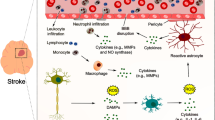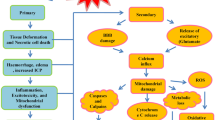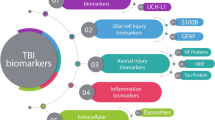Abstract
In traumatic brain injury (TBI), mechanical injury results in instantaneous tissue damages accompanied by subsequent pro-inflammatory cascades composed of microgliosis and astrogliosis. However, the interactive roles between microglia and astrocytes during the pathogenesis of TBI remain unclear and sometimes debatable. In this study, we used a forebrain stab injury mouse model to investigate the pathological role of reactive astrocytes in cellular and molecular changes of inflammatory response following TBI. In the ipsilateral hemisphere of stab-injured brain, monocyte infiltration and neuronal loss, as well as increased elevated astrogliosis, microglia activation and inflammatory cytokines were observed. To verify the role of reactive astrocytes in TBI, local and partial ablation of astrocytes was achieved by stereotactic injection of diphtheria toxin in the forebrain of Aldh1l1-CreERT2::Ai9::iDTR transgenic mice which expressed diphtheria toxin receptor (DTR) in astrocytes after tamoxifen induction. This strategy achieved about 20% of astrocytes reduction at the stab site as validated by immunofluorescence co-staining of GFAP with tdTomato-positive astrocytes. Interestingly, reduction of astrocytes showed increased microglia activation and monocyte infiltration, accompanied with increased severity in stab injury-induced neuronal loss when compared with DTR−/− mice, together with elevation of inflammatory chemokines such as CCL2, CCL5 and CXCL10 in astrogliosis-reduced mice. Collectively, our data verified the interactive role of astrocytes as an immune modulator in suppressing inflammatory responses in the injured brain.
Graphical Abstract
Schematic diagram shows monocyte infiltration and neuronal loss, as well as increased elevated astrogliosis, microglia activation and chemokines were observed in the injured site after stab injury. Local and partial ablation of astrocytes led to increased microglia activation and monocyte infiltration, accompanied with increased severity in neuronal loss together with elevation of inflammatory chemokines as compared with control mice subjected stab injury.






Similar content being viewed by others
Data Availability
The datasets used and analyzed during the course of this study are available from the corresponding author upon reasonable request.
References
Affandi AJ, Olesek K, Grabowska J, Nijen Twilhaar MK, Rodriguez E, Saris A, Zwart ES, Nossent EJ, Kalay H, de Kok M, Kazemier G, Stockl J, van den Eertwegh AJM, de Gruijl TD, Garcia-Vallejo JJ, Storm G, van Kooyk Y, den Haan JMM (2021) CD169 defines activated CD14(+) monocytes with enhanced CD8(+) T cell activation capacity. Front Immunol 12:697840. https://doi.org/10.3389/fimmu.2021.697840
Allahyari RV, Garcia AD (2015) Triggering reactive gliosis in vivo by a forebrain stab injury. J vis Exp. https://doi.org/10.3791/52825
Bennett ML, Bennett FC, Liddelow SA, Ajami B, Zamanian JL, Fernhoff NB, Mulinyawe SB, Bohlen CJ, Adil A, Tucker A, Weissman IL, Chang EF, Li G, Grant GA, Hayden Gephart MG, Barres BA (2016) New tools for studying microglia in the mouse and human CNS. Proc Natl Acad Sci U S A 113(12):E1738-1746. https://doi.org/10.1073/pnas.1525528113
Burda JE, Sofroniew MV (2014) Reactive gliosis and the multicellular response to CNS damage and disease. Neuron 81(2):229–248. https://doi.org/10.1016/j.neuron.2013.12.034
Burda JE, Bernstein AM, Sofroniew MV (2016) Astrocyte roles in traumatic brain injury. Exp Neurol 275(Pt 3):305–315. https://doi.org/10.1016/j.expneurol.2015.03.020
Bush TG, Puvanachandra N, Horner CH, Polito A, Ostenfeld T, Svendsen CN, Mucke L, Johnson MH, Sofroniew MV (1999) Leukocyte infiltration, neuronal degeneration, and neurite outgrowth after ablation of scar-forming, reactive astrocytes in adult transgenic mice. Neuron 23(2):297–308. https://doi.org/10.1016/s0896-6273(00)80781-3
Chen T, Lennon VA, Liu YU, Bosco DB, Li Y, Yi MH, Zhu J, Wei S, Wu LJ (2020) Astrocyte-microglia interaction drives evolving neuromyelitis optica lesion. J Clin Invest 130(8):4025–4038. https://doi.org/10.1172/JCI134816
Di Giovanni S, Movsesyan V, Ahmed F, Cernak I, Schinelli S, Stoica B, Faden AI (2005) Cell cycle inhibition provides neuroprotection and reduces glial proliferation and scar formation after traumatic brain injury. Proc Natl Acad Sci U S A 102(23):8333–8338. https://doi.org/10.1073/pnas.0500989102
Garwood CJ, Pooler AM, Atherton J, Hanger DP, Noble W (2011) Astrocytes are important mediators of abeta-induced neurotoxicity and tau phosphorylation in primary culture. Cell Death Dis 2:e167. https://doi.org/10.1038/cddis.2011.50
Gill J, Latour L, Diaz-Arrastia R, Motamedi V, Turtzo C, Shahim P, Mondello S, DeVoto C, Veras E, Hanlon D, Song L, Jeromin A (2018) Glial fibrillary acidic protein elevations relate to neuroimaging abnormalities after mild TBI. Neurology 91(15):e1385–e1389. https://doi.org/10.1212/WNL.0000000000006321
Gordon S, Pluddemann A, Martinez Estrada F (2014) Macrophage heterogeneity in tissues: phenotypic diversity and functions. Immunol Rev 262(1):36–55. https://doi.org/10.1111/imr.12223
Gorina R, Font-Nieves M, Marquez-Kisinousky L, Santalucia T, Planas AM (2011) Astrocyte TLR4 activation induces a proinflammatory environment through the interplay between MyD88-dependent NFkappaB signaling, MAPK, and Jak1/Stat1 pathways. Glia 59(2):242–255. https://doi.org/10.1002/glia.21094
Graham DI, McIntosh TK, Maxwell WL, Nicoll JA (2000) Recent advances in neurotrauma. J Neuropathol Exp Neurol 59(8):641–651. https://doi.org/10.1093/jnen/59.8.641
Gu N, Peng J, Murugan M, Wang X, Eyo UB, Sun D, Ren Y, DiCicco-Bloom E, Young W, Dong H, Wu LJ (2016) Spinal microgliosis due to resident microglial proliferation is required for pain hypersensitivity after peripheral nerve injury. Cell Rep 16(3):605–614. https://doi.org/10.1016/j.celrep.2016.06.018
Guilliams M, Mildner A, Yona S (2018) Developmental and functional heterogeneity of monocytes. Immunity 49(4):595–613. https://doi.org/10.1016/j.immuni.2018.10.005
Gyoneva S, Ransohoff RM (2015) Inflammatory reaction after traumatic brain injury: therapeutic potential of targeting cell-cell communication by chemokines. Trends Pharmacol Sci 36(7):471–480. https://doi.org/10.1016/j.tips.2015.04.003
Henry RJ, Ritzel RM, Barrett JP, Doran SJ, Jiao Y, Leach JB, Szeto GL, Wu J, Stoica BA, Faden AI, Loane DJ (2020) Microglial depletion with CSF1R inhibitor during chronic phase of experimental traumatic brain injury reduces neurodegeneration and neurological deficits. J Neurosci 40(14):2960–2974. https://doi.org/10.1523/JNEUROSCI.2402-19.2020
Jha MK, Jo M, Kim JH, Suk K (2019) Microglia-astrocyte crosstalk: an intimate molecular conversation. Neuroscientist 25(3):227–240. https://doi.org/10.1177/1073858418783959
Johnson VE, Stewart JE, Begbie FD, Trojanowski JQ, Smith DH, Stewart W (2013) Inflammation and white matter degeneration persist for years after a single traumatic brain injury. Brain 136(Pt 1):28–42. https://doi.org/10.1093/brain/aws322
Kabadi SV, Stoica BA, Zimmer DB, Afanador L, Duffy KB, Loane DJ, Faden AI (2015) S100B inhibition reduces behavioral and pathologic changes in experimental traumatic brain injury. J Cereb Blood Flow Metab 35(12):2010–2020. https://doi.org/10.1038/jcbfm.2015.165
Kim JH, Min KJ, Seol W, Jou I, Joe EH (2010) Astrocytes in injury states rapidly produce anti-inflammatory factors and attenuate microglial inflammatory responses. J Neurochem 115(5):1161–1171. https://doi.org/10.1111/j.1471-4159.2010.07004.x
Kleindienst A, McGinn MJ, Harvey HB, Colello RJ, Hamm RJ, Bullock MR (2005) Enhanced hippocampal neurogenesis by intraventricular S100B infusion is associated with improved cognitive recovery after traumatic brain injury. J Neurotrauma 22(6):645–655. https://doi.org/10.1089/neu.2005.22.645
Kratofil RM, Kubes P, Deniset JF (2017) Monocyte conversion during inflammation and injury. Arterioscler Thromb Vasc Biol 37(1):35–42. https://doi.org/10.1161/ATVBAHA.116.308198
Liu W, Tang Y, Feng J (2011) Cross talk between activation of microglia and astrocytes in pathological conditions in the central nervous system. Life Sci 89(5–6):141–146. https://doi.org/10.1016/j.lfs.2011.05.011
Liu LR, Liu JC, Bao JS, Bai QQ, Wang GQ (2020) Interaction of microglia and astrocytes in the neurovascular unit. Front Immunol 11:1024. https://doi.org/10.3389/fimmu.2020.01024
Loane DJ, Byrnes KR (2010) Role of microglia in neurotrauma. Neurotherapeutics 7(4):366–377. https://doi.org/10.1016/j.nurt.2010.07.002
Loane DJ, Kumar A (2016) Microglia in the TBI brain: the good, the bad, and the dysregulated. Exp Neurol 275(Pt 3):316–327. https://doi.org/10.1016/j.expneurol.2015.08.018
Loane DJ, Kumar A, Stoica BA, Cabatbat R, Faden AI (2014) Progressive neurodegeneration after experimental brain trauma: association with chronic microglial activation. J Neuropathol Exp Neurol 73(1):14–29. https://doi.org/10.1097/NEN.0000000000000021
Long X, Yao X, Jiang Q, Yang Y, He X, Tian W, Zhao K, Zhang H (2020) Astrocyte-derived exosomes enriched with miR-873a-5p inhibit neuroinflammation via microglia phenotype modulation after traumatic brain injury. J Neuroinflamm 17(1):89. https://doi.org/10.1186/s12974-020-01761-0
Mantovani A, Sica A, Sozzani S, Allavena P, Vecchi A, Locati M (2004) The chemokine system in diverse forms of macrophage activation and polarization. Trends Immunol 25(12):677–686. https://doi.org/10.1016/j.it.2004.09.015
Mercurio D, Fumagalli S, Schafer MKH, Pedragosa J, Ngassam LDC, Wilhelmi V, Winterberg S, Planas AM, Weihe E, De Simoni M-G (2022) Protein expression of the microglial marker tmem119 decreases in association with morphological changes and location in a mouse model of traumatic brain injury. Front Cell Neurosci. https://doi.org/10.3389/fncel.2022.820127
Michinaga S, Koyama Y (2021) Pathophysiological responses and roles of astrocytes in traumatic brain injury. Int J Mol Sci. https://doi.org/10.3390/ijms22126418
Mildner A, Huang H, Radke J, Stenzel W, Priller J (2017) P2Y12 receptor is expressed on human microglia under physiological conditions throughout development and is sensitive to neuroinflammatory diseases. Glia 65(2):375–387. https://doi.org/10.1002/glia.23097
Morganti-Kossmann MC, Rancan M, Otto VI, Stahel PF, Kossmann T (2001) Role of cerebral inflammation after traumatic brain injury: a revisited concept. Shock 16(3):165–177. https://doi.org/10.1097/00024382-200116030-00001
Morganti-Kossmann MC, Satgunaseelan L, Bye N, Kossmann T (2007) Modulation of immune response by head injury. Injury 38(12):1392–1400. https://doi.org/10.1016/j.injury.2007.10.005
Morrison H, Young K, Qureshi M, Rowe RK, Lifshitz J (2017) Quantitative microglia analyses reveal diverse morphologic responses in the rat cortex after diffuse brain injury. Sci Rep 7(1):13211. https://doi.org/10.1038/s41598-017-13581-z
Murugan M, Ravula A, Gandhi A, Vegunta G, Mukkamalla S, Mujib W, Chandra N (2020) Chemokine signaling mediated monocyte infiltration affects anxiety-like behavior following blast injury. Brain Behav Immun 88:340–352. https://doi.org/10.1016/j.bbi.2020.03.029
Myer DJ, Gurkoff GG, Lee SM, Hovda DA, Sofroniew MV (2006) Essential protective roles of reactive astrocytes in traumatic brain injury. Brain 129(Pt 10):2761–2772. https://doi.org/10.1093/brain/awl165
Ochocka N, Kaminska B (2021) Microglia diversity in healthy and diseased brain: insights from single-cell omics. Int J Mol Sci. https://doi.org/10.3390/ijms22063027
Paintlia MK, Paintlia AS, Singh AK, Singh I (2013) S-nitrosoglutathione induces ciliary neurotrophic factor expression in astrocytes, which has implications to protect the central nervous system under pathological conditions. J Biol Chem 288(6):3831–3843. https://doi.org/10.1074/jbc.M112.405654
Parkhurst CN, Yang G, Ninan I, Savas JN, Yates JR, Lafaille JJ, Hempstead BL, Littman DR, Gan W-B (2013) Microglia promote learning-dependent synapse formation through brain-derived neurotrophic factor. Cell 155(7):1596–1609. https://doi.org/10.1016/j.cell.2013.11.030
Plemel JR, Stratton JA, Michaels NJ, Rawji KS, Zhang E, Sinha S, Baaklini CS, Dong Y, Ho M, Thorburn K, Friedman TN, Jawad S, Silva C, Caprariello AV, Hoghooghi V, Yue J, Jaffer A, Lee K, Kerr BJ, Midha R, Stys PK, Biernaskie J, Yong VW (2020) Microglia response following acute demyelination is heterogeneous and limits infiltrating macrophage dispersion. Sci Adv 6(3):eaay6324. https://doi.org/10.1126/sciadv.aay6324
Ramesh G, MacLean AG, Philipp MT (2013) Cytokines and chemokines at the crossroads of neuroinflammation, neurodegeneration, and neuropathic pain. Mediators Inflamm 2013:480739. https://doi.org/10.1155/2013/480739
Ramlackhansingh AF, Brooks DJ, Greenwood RJ, Bose SK, Turkheimer FE, Kinnunen KM, Gentleman S, Heckemann RA, Gunanayagam K, Gelosa G, Sharp DJ (2011) Inflammation after trauma: microglial activation and traumatic brain injury. Ann Neurol 70(3):374–383. https://doi.org/10.1002/ana.22455
Ritzel RM, He J, Li Y, Cao T, Khan N, Shim B, Sabirzhanov B, Aubrecht T, Stoica BA, Faden AI, Wu LJ, Wu J (2021) Proton extrusion during oxidative burst in microglia exacerbates pathological acidosis following traumatic brain injury. Glia 69(3):746–764. https://doi.org/10.1002/glia.23926
Robel S, Bardehle S, Lepier A, Brakebusch C, Gotz M (2011) Genetic deletion of cdc42 reveals a crucial role for astrocyte recruitment to the injury site in vitro and in vivo. J Neurosci 31(35):12471–12482. https://doi.org/10.1523/JNEUROSCI.2696-11.2011
Rosa JM, Farre-Alins V, Ortega MC, Navarrete M, Lopez-Rodriguez AB, Palomino-Antolin A, Fernandez-Lopez E, Vila-Del Sol V, Decouty C, Narros-Fernandez P, Clemente D, Egea J (2021) TLR4 pathway impairs synaptic number and cerebrovascular functions through astrocyte activation following traumatic brain injury. Br J Pharmacol 178(17):3395–3413. https://doi.org/10.1111/bph.15488
Rosenfeld JV, Maas AI, Bragge P, Morganti-Kossmann MC, Manley GT, Gruen RL (2012) Early management of severe traumatic brain injury. Lancet 380(9847):1088–1098. https://doi.org/10.1016/S0140-6736(12)60864-2
Schipke CG, Boucsein C, Ohlemeyer C, Kirchhoff F, Kettenmann H (2002) Astrocyte Ca2+ waves trigger responses in microglial cells in brain slices. FASEB J 16(2):255–257. https://doi.org/10.1096/fj.01-0514fje
Scott MC, Bedi SS, Olson SD, Sears CM, Cox CS (2021) Microglia as therapeutic targets after neurological injury: strategy for cell therapy. Expert Opin Ther Targets 25(5):365–380. https://doi.org/10.1080/14728222.2021.1934447
Sofroniew MV (2015) Astrocyte barriers to neurotoxic inflammation. Nat Rev Neurosci 16(5):249–263. https://doi.org/10.1038/nrn3898
Sofroniew MV, Vinters HV (2010) Astrocytes: biology and pathology. Acta Neuropathol 119(1):7–35. https://doi.org/10.1007/s00401-009-0619-8
Susarla BT, Villapol S, Yi JH, Geller HM, Symes AJ (2014) Temporal patterns of cortical proliferation of glial cell populations after traumatic brain injury in mice. ASN Neuro 6(3):159–170. https://doi.org/10.1042/AN20130034
Vankriekelsvenne E, Chrzanowski U, Manzhula K, Greiner T, Wree A, Hawlitschka A, Llovera G, Zhan J, Joost S, Schmitz C, Ponsaerts P, Amor S, Nutma E, Kipp M, Kaddatz H (2022) Transmembrane protein 119 is neither a specific nor a reliable marker for microglia. Glia. https://doi.org/10.1002/glia.24164
Walker PA, Shah SK, Jimenez F, Gerber MH, Xue H, Cutrone R, Hamilton JA, Mays RW, Deans R, Pati S, Dash PK, Cox CS Jr (2010) Intravenous multipotent adult progenitor cell therapy for traumatic brain injury: preserving the blood brain barrier via an interaction with splenocytes. Exp Neurol 225(2):341–352. https://doi.org/10.1016/j.expneurol.2010.07.005
Wang M, Wang X, Zhao L, Ma W, Rodriguez IR, Fariss RN, Wong WT (2014) Macroglia-microglia interactions via TSPO signaling regulates microglial activation in the mouse retina. J Neurosci 34(10):3793–3806. https://doi.org/10.1523/JNEUROSCI.3153-13.2014
Werner C, Engelhard K (2007) Pathophysiology of traumatic brain injury. Br J Anaesth 99(1):4–9. https://doi.org/10.1093/bja/aem131
Wicher G, Wallenquist U, Lei Y, Enoksson M, Li X, Fuchs B, Abu Hamdeh S, Marklund N, Hillered L, Nilsson G, Forsberg-Nilsson K (2017) Interleukin-33 promotes recruitment of microglia/macrophages in response to traumatic brain injury. J Neurotrauma 34(22):3173–3182. https://doi.org/10.1089/neu.2016.4900
Wilhelmsson U, Li L, Pekna M, Berthold CH, Blom S, Eliasson C, Renner O, Bushong E, Ellisman M, Morgan TE, Pekny M (2004) Absence of glial fibrillary acidic protein and vimentin prevents hypertrophy of astrocytic processes and improves post-traumatic regeneration. J Neurosci 24(21):5016–5021. https://doi.org/10.1523/JNEUROSCI.0820-04.2004
Wilson L, Stewart W, Dams-O’Connor K, Diaz-Arrastia R, Horton L, Menon DK, Polinder S (2017) The chronic and evolving neurological consequences of traumatic brain injury. Lancet Neurol 16(10):813–825. https://doi.org/10.1016/S1474-4422(17)30279-X
Witcher KG, Bray CE, Chunchai T, Zhao F, O’Neil SM, Gordillo AJ, Campbell WA, McKim DB, Liu X, Dziabis JE, Quan N, Eiferman DS, Fischer AJ, Kokiko-Cochran ON, Askwith C, Godbout JP (2021) Traumatic brain injury causes chronic cortical inflammation and neuronal dysfunction mediated by microglia. J Neurosci 41(7):1597–1616. https://doi.org/10.1523/JNEUROSCI.2469-20.2020
Xia Y, Kong L, Yao Y, Jiao Y, Song J, Tao Z, You Z, Yang J (2015) Osthole confers neuroprotection against cortical stab wound injury and attenuates secondary brain injury. J Neuroinflamm 12:155. https://doi.org/10.1186/s12974-015-0373-x
Yao H, Yang Y, Kim KJ, Bethel-Brown C, Gong N, Funa K, Gendelman HE, Su TP, Wang JQ, Buch S (2010) Molecular mechanisms involving sigma receptor-mediated induction of MCP-1: implication for increased monocyte transmigration. Blood 115(23):4951–4962. https://doi.org/10.1182/blood-2010-01-266221
Young KF, Gardner R, Sariana V, Whitman SA, Bartlett MJ, Falk T, Morrison HW (2021) Can quantifying morphology and TMEM119 expression distinguish between microglia and infiltrating macrophages after ischemic stroke and reperfusion in male and female mice? J Neuroinflamm 18(1):58. https://doi.org/10.1186/s12974-021-02105-2
Zamanian JL, Xu L, Foo LC, Nouri N, Zhou L, Giffard RG, Barres BA (2012) Genomic analysis of reactive astrogliosis. J Neurosci 32(18):6391–6410. https://doi.org/10.1523/JNEUROSCI.6221-11.2012
Zhang J, Xu J, Zhang RX, Zhang Y, Ou QJ, Li JQ, Jiang ZZ, Wu XJ, Fang YJ, Zheng L (2016) CD169 identifies an activated CD8(+) T cell subset in regional lymph nodes that predicts favorable prognosis in colorectal cancer patients. Oncoimmunology 5(7):e1177690. https://doi.org/10.1080/2162402x.2016.1177690
Funding
This study was funded by the National Natural Science Foundation of China (No. 81925031, 81820108026), Guangzhou Science and Technology Program key projects (202007030001) to Yamei Tang; National Natural Science Foundation of China (No. 82103775) to Zhongshan Shi; National Natural Science Foundation of China (No. 81972967), Guangdong Science and Technology Department (2020B1212060018), Natural Science Foundation of Guangdong Province (2019A1515011754) to Wei-Jye Lin; National Natural Science Foundation of China (81872549), and Guangdong-Hong Kong-Macao Greater Bay Area Center for Brain Science and Brain-Inspired Intelligence Fund (2019012) to Yi Li; National Natural Science Foundation of China (No. 82003389) to Honghong Li; Youth Program of National Natural Science Foundation of China (No. 81801229) to Yongteng Xu.
Author information
Authors and Affiliations
Contributions
YT and MZ conceptualized and designed the study, and revised the manuscript. XH, SL and ZS bred the transgenic mice, performed the stab model, immunofluorescence and qPCR experiments, and wrote the first draft of manuscript. WL, YY, YL, HL and YX collected and analyzed the data and revised the manuscript. All authors read and approved the final manuscript.
Corresponding authors
Ethics declarations
Conflict of interest
The authors have no conflict of interest.
Ethical Approval
Animals used in the study were handled in accordance with the Guide for the Care and Use of Laboratory Animals published by the National Institutes of Health. All animal protocols were approved by the Animal Care and Use Committee of Sun Yat-sen University. This article does not contain any studies with human participants performed by any of the authors.
Consent to Participate
Not applicable.
Consent to Publish
Not applicable.
Additional information
Publisher's Note
Springer Nature remains neutral with regard to jurisdictional claims in published maps and institutional affiliations.
Supplementary Information
Below is the link to the electronic supplementary material.
Rights and permissions
About this article
Cite this article
Hu, X., Li, S., Shi, Z. et al. Partial Ablation of Astrocytes Exacerbates Cerebral Infiltration of Monocytes and Neuronal Loss After Brain Stab Injury in Mice. Cell Mol Neurobiol 43, 893–905 (2023). https://doi.org/10.1007/s10571-022-01224-5
Received:
Accepted:
Published:
Issue Date:
DOI: https://doi.org/10.1007/s10571-022-01224-5




